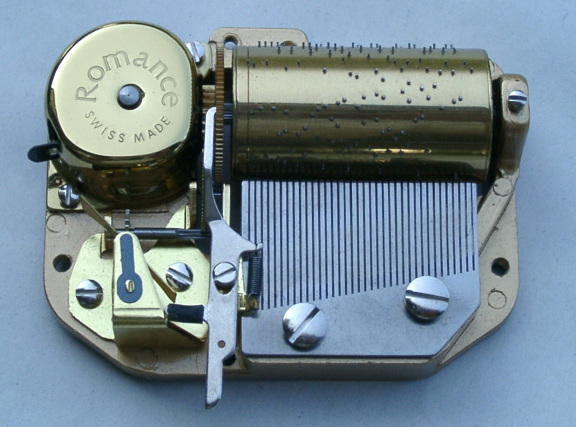I
would like to tell you about smaller movements.
You get them with 1
to 4 tunes per cylinder and 12 to 72 teeth per comb.
It consist out
of a cylinder, a comb, a speed controller, a lever to switch it
on and
off and a spring in a capsule to let it run. If there are 2 or
more tunes on a cylinder
a tunechanger is needed. It will shift
the cylinder a millimeter aside after each rotation;
then other pins
are activ. If all tunes are played the cylinder will jump back to the
beginning.

- Cylinder - a tube with small embedded pins.

-
Comb - steel plate with a
series of tuned teeth
which plucked by the pins of the
cylinder;
short teeth ===> high note;
long teeth
===> low note.

To
get a note lower - a small lead weight is attached
underneath a tooth.
A small plastic strip underneath the tip of a
tooth is the damper.
After a tooth has been plucked it will vibrate
for a while. If the next
pin comes into contact with a tooth which is
still vibrating, a raspy
or buzzing sound will be the outcome. If
there is a damper the next
pin will contact at first the damper; the vibration will stop and after
that the tooth will be plucked.

-
Spring - in
a capsule. Smaller movements mainly get wind up with a key
under the
bottom of a box. Via rack-wheels the power of the
spring will let rotate the cylinder.

-
Speed Controller - an upright
shaft; in the upper part a crosswise standing stripe of metal.
Via
rack-wheels there is a connection to the cylinder. The spring will
let rotate the
shaft and the stripe of metal is twirl the air. A
constant rotating speed is adjusted.

